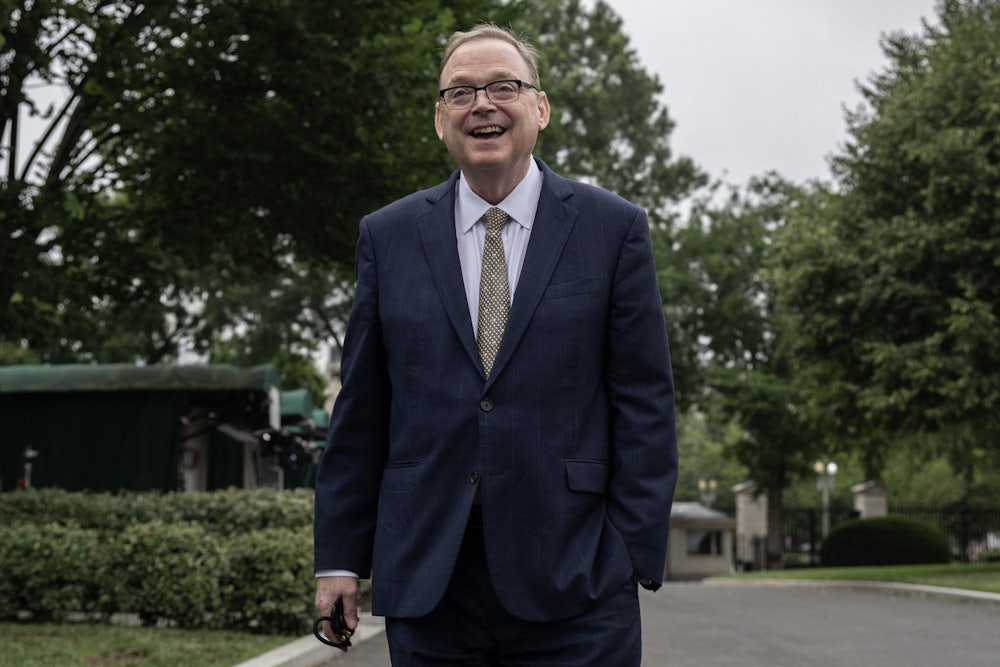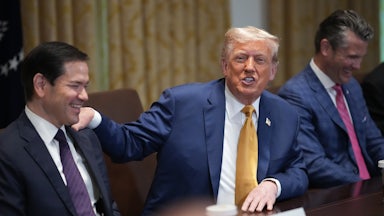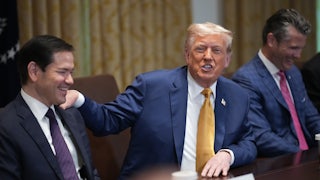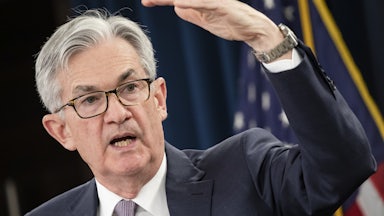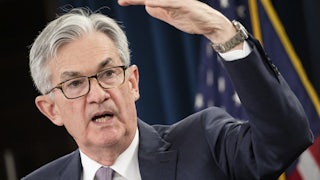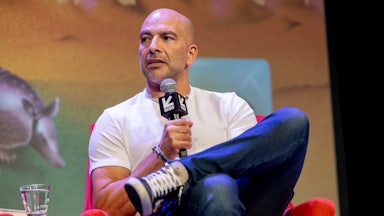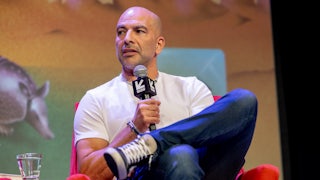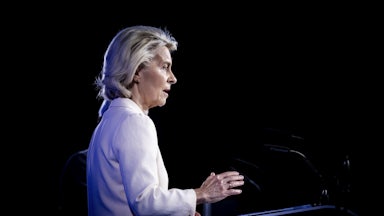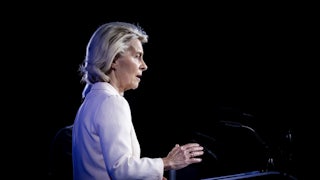Last week, I considered whether there was a limit to how extravagantly President Donald Trump could be flattered before he started to detect a note of contempt. My tentative finding was “no.” Contemporary society, I explained, is much more preoccupied with receiving adequate appreciation than with mistrusting those who give more than we deserve. And even within this age of underfed egos, Trump’s insatiable hunger for flattery lies so far outside the normal range as to merit its own entry in the Diagnostic and Statistical Manual of Mental Disorders.
Today let’s use this insight to handicap the race to become the next chairman of the Federal Reserve.
I’m on record predicting that, even though the term of the current chairman, Jerome Powell, will end next May, and even though the Supreme Court has fired a warning shot that it might not countenance removing Powell without cause before then, Trump lacks the impulse control necessary to wait 10 months.
The latest is that Trump is building a transparently fake justification to fire Powell for cause. On Thursday Trump’s wily budget director, Russell “Project 2025” Vought, wrote Powell to say the president is “extremely troubled” about an “ostentatious overhaul” of the Fed’s D.C. headquarters, and on the following day Vought went on CNBC to say this move demonstrates “the fundamental mismanagement of the Fed under the chairman.” Vought went on to say that the National Capital Planning Commission, to which Trump last week appointed three close associates, plans to investigate the matter.
“What they’re trying to manufacture,” Scott Alvarez, former general counsel for the Fed, explained to Bloomberg, “is some ‘cause’ not related to monetary policy disagreements.”
Previously, the lead candidate to replace Powell was the former Fed governor Kevin Warsh, who was in the running for chair when Trump chose Powell eight years ago. But according to Brian Schwartz and Nick Timiraos of The Wall Street Journal, Warsh’s prospects have lately faded because he’s an inflation hawk. That’s provided an opening for another Kevin: Kevin Hassett, director of the White House National Economic Council.
Hassett’s most distinguishing characteristic is an extreme eagerness to say what Trump wants to hear. Per Schwartz and Timiraos, Hassett learned “to adopt his positions to the president’s instincts.” The Washington Post’s Andrew Ackerman wrote Monday that Hassett is “one of the few advisers who have endeared themselves to the president while staying in his good graces,” a redundant construction (if you stay in someone’s good graces then quite obviously you’ve endeared yourself) that makes sense only if intended to communicate that Hassett is a shameless sycophant. “It’s honestly like Kevin Hassett and Howard Lutnick are battling it out for the title of America’s Most Embarrassing Sycophant,” observed the financial writer James Surowiecki this past weekend. (See my April post, “Everybody Hates Howard Lutnick.”)
Hassett is indeed shameless about changing his positions to toe the party line. “The Fed—independence is respected,” Hassett said in February. Two months later, when asked if Trump could fire Powell, Hassett said, “The President and his team will continue to study that matter.” They’re still studying it, Hassett said this past Sunday on ABC’s This Week (what a studious bunch!), “but certainly, if there’s cause, he does” have the power to fire Powell. Hassett suggested there was cause aplenty in the Fed’s cost overruns.
A couple of weeks before the 2024 election. Hassett said that barring “a specific security concern or anti-dumping concern,” a reciprocal or universal tariff “has to be passed by Congress.” But after the United States Court of International Trade agreed with that statement and struck down many of Trump’s unilateral tariffs, Hassett pirouetted to griping that “activist judges are trying to slow down something right in the middle of really important negotiations.”
Trump then raised the stakes, threatening a 50 percent tariff on Brazil, even though the United States has a $6.8 billion trade surplus with that country, because Trump didn’t like Brazil’s prosecution of former President Jair Bolsonaro for allegedly plotting a coup. When Jonathan Karl asked Hassett about this on This Week, Hassett repeatedly changed the topic before stating that if Trump “thinks it’s a national defense emergency or if he thinks it’s a national security threat ... he has the authority” under the 1977 International Emergency Economic Powers Act to impose a 50 percent tariff on Brazil. (Click here to read why that is obvious bullshit.)
The following hilarious exchange ensued:
Karl: So, how is it a national security threat that, you know, how Brazil is handling a criminal case against this former president?
Hassett: Well, that’s not the only thing. That’s not the only thing. I mean—
Karl: So, what is it? I mean, I’ve asked what it is. I mean, it seems that that’s what President Trump’s talking about. He’s talking about his anger and his frustration. He’s been quite candid about it with the Bolsonaro case.
Hassett: Right. Well, the bottom line is that what we’re doing absolutely, collectively, across every country, is we’re onshoring production in the U.S. to reduce the national emergency that is—that we have a massive trade deficit, that’s putting it at risk should we need production in the U.S. because of a national security crisis. And this is part of an overall strategy to do that.
Karl: But again, as we’ve just established, we have a trade surplus with Brazil, not a deficit.
Hassett: But --
Karl: And we’ve had a surplus with Brazil for 18 years.
Hassett: If you look at an overall strategy, if you don’t have an overall strategy for this, then there’ll be trans shipping and everything else, and you won’t achieve your objectives.
Karl: Okay. I’m still confused, but let me move on.
In that same appearance, Hassett referred to Trump as “one of the most successful, if not the most successful, businessmen in the 20th century.”
Warsh may be down, but he isn’t out. The guy who, last month, was intoning that “inflation is a choice” and that spending was out of control, called for lower interest rates in an appearance this past weekend on Fox News, and praised Trump for “putting the fiscal house in order through this tax bill.” That would be the same tax bill that, according to the Congressional Budget Office, doubles the budget deficit. “We’re going to grow a lot more than the Congressional Budget Office says,” Warsh said. Pooh-poohing the CBO is a central Trump loyalty test.
Not to be outdone by Hassett on the cost overruns, Warsh said that when he was at the Fed a decade ago, he was partially responsible for the Fed budget and became familiar with bureaucratic pressures to overspend. “I can’t imagine that that’s a good use of taxpayer money,” Warsh said. “Maybe a new paint job, maybe some fresh computer terminals.”
Meanwhile, Treasury Secretary Scott Bessent, a dark horse candidate for the job, complained on Fox News that “I guess this tariff derangement syndrome happens even over at the Fed.” Never mind that Bessent’s own most notable role in Trump’s tariff policy has been to delay implementation of the tariffs. Trump advisors have reportedly considered appointing Bessent Fed chair while he remains Treasury secretary. (As The New York Times reported Friday, one way the Trump administration envisions government efficiency is to saddle its members with multiple jobs.)
Two other dark-horse candidates, Fed governor Christopher Waller and Fed vice chair Michelle Bowman, have called publicly for rate cuts, which is defensible. They’ve also both stated that they don’t expect Trump’s tariffs to be inflationary, which is not. Saying tariffs aren’t inflationary is something no economic expert would ever say unless he or she was angling for a better job in the Trump administration. Waller’s even done a little TV, appearing last month on CNBC’s “Squawk Box.” But in June, Waller and Bowman both voted with Powell to keep rates steady, and anyway, if the Trump strategy is to delegitimize Powell by criticizing cost overruns, it’s difficult to see how Trump can replace Powell with some other high-ranking official at this supposedly spendthrift agency.
Thus the state of play: Waller and Bowman are almost certainly out of the running, and Warsh and Bessent are down but not out. If the choice boils down to which candidate for Fed chair is most willing to debase himself, then Hassett will be hard to beat. And why shouldn’t Trump pay attention up front to a candidate’s capacity for self-debasement? Whoever succeeds Powell as Fed chair will be expected to furnish an unprecedented quantity of it going forward.
